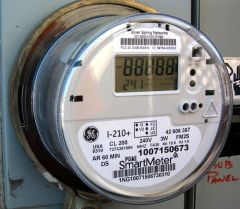SUBSCRIBE to
Local Clean Energy
News & Alerts
Net metering: A net positive for California
 As Susannah Churchill of Vote Solar explains, net metering “allows customers who install solar or other clean energy to get fair credit on their power bills for the energy they feed back to the grid.” The question, though, is what constitutes “fair credit,” and whether net metering customers are passing on to other customers an unfair burden of utility transmission and distribution charges.
As Susannah Churchill of Vote Solar explains, net metering “allows customers who install solar or other clean energy to get fair credit on their power bills for the energy they feed back to the grid.” The question, though, is what constitutes “fair credit,” and whether net metering customers are passing on to other customers an unfair burden of utility transmission and distribution charges.
This question was the main topic at the Local Clean Energy Alliance’s well-attended April 24 program on how California values solar PV.
 Susannah’s presentation argued that the net metering credit is indeed fair, a conclusion supported by a recent study Vote Solar commissioned from Crossborder Energy. The Crossborder study found that the benefits of net metering (for example, savings on infrastructure investments and on the cost of meeting state renewables requirements) outweigh the costs (such as lower revenue to cover utility infrastructure investments).
Susannah’s presentation argued that the net metering credit is indeed fair, a conclusion supported by a recent study Vote Solar commissioned from Crossborder Energy. The Crossborder study found that the benefits of net metering (for example, savings on infrastructure investments and on the cost of meeting state renewables requirements) outweigh the costs (such as lower revenue to cover utility infrastructure investments).
The way Vote Solar sees it, net metering has been key to the success of solar in California -- creating thousands of jobs, bringing billions in investments to the state, and saving billions for schools and other public agencies. In addition, it’s helped low- and median-income families reap the benefits of going solar.
So Vote Solar’s position is basically, why fix what isn’t broken?
The California Sierra Club agrees. Representing the Club on April 24 was Andy Katz of the California Club’s Energy-Climate Committee. He noted that solar energy helps reduce peak load, and net metering is a quick and easy solution that provides a stable, ongoing incentive for solar. He also echoed Vote Solar’s point that upcoming rate design changes could make net metering even more beneficial.
Energy-Climate Committee. He noted that solar energy helps reduce peak load, and net metering is a quick and easy solution that provides a stable, ongoing incentive for solar. He also echoed Vote Solar’s point that upcoming rate design changes could make net metering even more beneficial.
Utilities, not surprisingly, don’t agree. They’re set up to make substantial profits from large infrastructure investments, and net metering poses a risk to that business model.
 Somewhere in between these positions is The Utility Reform Network (TURN), represented on April 24 by Marcel Hawiger. Like utilities, TURN is concerned that net metering allows customers to use the grid for free as an electricity storage infrastructure. This is particularly true for residential customers, who don’t tend to use all the power they’re producing during the day and then retrieve that excess off the grid at night. And those customers are under a tiered-rate structure that credits them unequally for their power.
Somewhere in between these positions is The Utility Reform Network (TURN), represented on April 24 by Marcel Hawiger. Like utilities, TURN is concerned that net metering allows customers to use the grid for free as an electricity storage infrastructure. This is particularly true for residential customers, who don’t tend to use all the power they’re producing during the day and then retrieve that excess off the grid at night. And those customers are under a tiered-rate structure that credits them unequally for their power.
For example, say two PG&E customers each produce 800 kWh per month but one uses 1000 kWh and the other uses 2000 kWh. Because the customer using more power is in a higher rate tier, that customer is being charged at a higher overall rate. That customer therefore gets a higher credit for the solar power sent into to the grid.
In other words, Marcel said, we’re not paying people equitably for the solar power they produce. How to fix this? Pay everyone the same price. And a fair price would be more than what PG&E pays for dirty energy or remote large-scale solar, since rooftop solar provides benefits that neither of those can.
And that brings us back to the larger picture. While even Vote Solar’s study showed only a small net financial benefit from net metering to California utilities and their customers, it didn’t include the larger benefits that are harder to quantify -- foremost among those, a healthier environment and a healthier economy. When you add those, net metering looks more and more like a net gain.
Article by Rosana Francescato
- Log in to post comments
